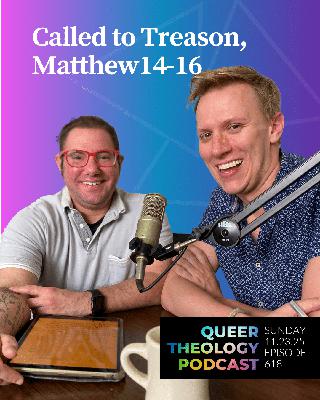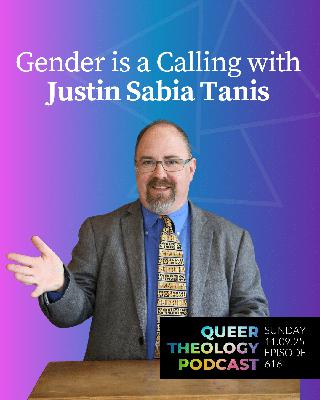Throwback: The End. Or is it? Matthew 26-28
Description
In this week’s throwback episode, we return to the final episode of our eight-part series on Matthew. And here is where we come to crucifixion and resurrection.. The End… but really, the Beginning! It’s important for us to call out and recognize in these texts the significant polemic against the Jewish leaders, even if most of Matthew’s audience still considered themselves to be Jewish. The context is crucial here for us to not continue the anti-semitic rhetoric that “the Jews killed Jesus”, but underline that the Roman Empire killed Jesus. We have stories of the anointing of Jesus, the last supper, his betrayal, the trial, and subsequent punishment of death. From the story of the resurrection, we really look at who Jesus entrusted the continued work of discipleship. It is not to perfect angels that this work is given to continue, but to the doubting, flawed, messy, complicated people. How can we embrace that same call to follow Jesus today?
Resources:
- Journey Into the Bible part of Spiritual Study Hall
- Join our online community at Sanctuary Collective Community
If you want to support the Patreon and help keep the podcast up and running, you can learn more and pledge your support at patreon.com/queertheology
This transcript was generated by AI and may contain errors or omissions.
(1m 56s):
Welcome to the Queer Theology Podcast. I’m Brian G Murphy. And I’m father Shannon, T l Kearns. We’re the co-founders of Queer Theology dot com and your hosts From Genesis to Revelation. The Bible declares good news to LGBTQ plus people, and we want to show you how tuning Each week on Sunday for conversations about Christianity, queerness and transness, and how they can enrich one another. We’re glad you’re here. Hello. Hello. And welcome back to the Queer Theology Podcast. Can you believe that we are at the final, the final section of our deep dive into the gospel of Matthew? I can hardly believe it, to be honest.
(2m 37s):
This has been a ride. Yeah. You know, before we dive into these final things, I just wanna say, you know, Brian, you And I have talked about how over the years of doing the lectionary that revisiting these texts, even texts that we were super, super familiar with, that we learned and discovered new things about the stories about ourselves because that we were different from the time that we had revisited them. And I, And I have to say that doing this deep dive and reading this kind of in order all along, like I’ve learned so many new things, even though I already, I felt like I already knew a lot. And I’m wondering what this experience has been like for you.
(3m 17s):
It you feeling that too? Like what’s, what’s kind of standing out for you? Yeah, I also feel like I am learning new things. Finding new things. You know, I think that a few weeks ago I said something like, it just scripture’s kind of like a, like a, a fruit where you, or an orange where you can, like, there’s always sort of like more that you can, you can squeeze out of it. And so returning to some of these texts, some, some of that we’ve covered on the podcast, some that we, that I just sort of know outside of the podcast in my own personal life, I definitely am finding new, like completely new information about them as I’m, you know, reading commentaries on it and reading my, like looking at the notes in the study bible and, and learning from you.
(3m 58s):
I’m like, oh, I, like, there’s a, there’s some some facts that I didn’t know that enriched my understanding of the text. And then there’s an element of just sort of like experiencing the text in a different way and relating to it in a different way. And, and maybe like, I knew everything, quote, you knew everything, but different things are sticking out to me or I’m making new and different connections from the text to my own life. And I think there’s also been an additional element of, by reading the whole, the whole book of Matthew from start to finish, but also not rushing through it. Like we didn’t read the whole book of Matthew over the course of, you know, three days a week.
(4m 40s):
Even we read it over the course of two months. I think that like, sitting in that, I feel like I was able to sort of like dip into and immerse myself more fully in that world because I was really like spending a lot of time rolling around in there rather than getting in or getting out. It reminds me of, you know, like if you’re doing a meditation practice, sometimes it takes like a few minutes to like to settle in, right? It’s like if you only meditate for two minutes, like that can be helpful in its own way, way, but it’s not the same as like doing a 10 or a 20 or a 30 minute meditation or, you know, you know, there’s all that sort of research around focus that like, every time you switch between tasks or apps, it takes your brain a little bit of time to like reorient yourself.
(5m 28s):
And so like, you know, as a, as a, you’re a writer Shay, you know, like you can’t write a novel in spurts of, oh, you, maybe you could, but like writing a novel in spurts of five minutes is gonna be different than like really being able to sort of like sink in and absorb. Or if you’re a reader, even like when you’re like on your, when you’re like on the, the couch with a book for like hours on a, you know, on a rainy day that feels different than reading for, you know, five, 10 minutes on the subway to and from work. They’re like, they’re both interesting. But I like, I I, so I noticed that sort of like, sense of immersion in the text, which I really appreciated. Yeah. And I, I think what you said is so interesting, right?
(6m 8s):
Because we, I’ve been talking with some folks who are, who are wanting to, to start spiritual rituals and, and they’re feeling this weight of, I don’t know where to start. I don’t have the perfect amount of time. And so I think that there’s like a yes and to your five minutes a day, right? Like it’s so like, you’re right, you, you could totally write a novel in five minutes a day and also at some point you’re probably gonna have to sink deeply into it for hours at a time in order to revise, to fix the story, et cetera. And also, if you don’t spend the five minutes a day or whatever it is that will take you to get started, you’re never gonna have the novel to revise. And I think that that’s the same with spiritual practices, right?
(6m 49s):
Yeah. If You wait until you have the perfect hour of total silence when no one else is in the house, and you have the fancy candle and the right matches and the whatever it is that you tell yourself you really need in order to pray or to meditate, like you’re just never gonna do it. And so that, that tension of you gotta just dive in and also at some point in the diving in, what does it take for you to have a more settled and in-depth practice? Yeah. You know, I really enjoy those, you know, days where I am cuddled up on the couch reading a book for hours. But pretty much every book that I’ve ever spent done that with, I first like impulse bought the book and then like immediately opened it and read just for five minutes, right?
(7m 34s):
And then, and then I had to like move on with my life. And it’s like oftentimes I like do a few, like many blocks of reading in shorter spurts before, like, I, I, the, the, the story starts to like draw me in and then, And I get, I’m in the prac, I get into the habit of reading, you know, I start to like connect with the characters more. I get excited about the story and then I can sort of like settle in deeper. And so like, if you have a, if you don’t read the Bible at all currently or you haven’t read the Bible in years, the Bible feels scary. You don’t, like, you don’t have to, you know, spend hours every day reading the Bible. Like, don’t do that. But like, if you have a question about like, oh, I wonder what that story that I always like really, you know, enjoyed or appreciated or thought was weird or didn’t like, like I went to what was going on there.
(8m 22s):
Like, you can start right now looking for answers to those questions. And then he always say, should I continue to, to follow your curiosity? This was like a good time to plug, like, as this, as this series is wrapping up, if you want to like learn how to do this sort of work, we have like a whole self-paced course called journeying to the Bible that like walks you through the process that we did with Matthew so that you can do it on your own for any book or any passage or any story in the Bible, you can find that and others at Queer Theology dot com slash resources. Alright, let’s do it. We, let’s do our, are looking at chapters 26 through 28.
(9m 4s):
These are the last four chapters, three chapters Math Never been My Strong Suit of the Gospel of Matthew. We are still in holy week. We’re actually just at Wednesday. So we, we the entire like long, long podcast that we did last week was Monday and Tuesday chapter 26 starts Wednesday. Here’s some things you should know as we dive in. The gospel of Matthew super, super closely follows Mark’s story. Matthew adds a couple of things. He adds the story of the fate of Judas, w
























